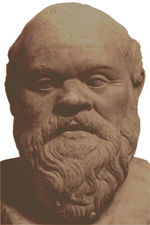Incontinence (philosophy)

Incontinence ("a want of continence or self-restraint") is often used by philosophers to translate the Greek term Akrasia. Akrasia (ἀκρασία) is literally defined as "lacking control (over oneself)".
Incontinence, as a philosophical and religious concept, is closely related to Eschatology - the study of the ultimate end of things.
Classical approaches[edit | edit source]
The problem goes back at least as far as Plato. Socrates (in Plato's Protagoras) asks precisely how this is possible—if one judges a lack of movement to be the best course of action, why would one make a movement?
In the dialogue Protagoras, Socrates attests that incontinence is an illogical concept, claiming “No one willingly soils their character”. If a person examines their physical need they will act in a way that causes the least discomfort or embarrassment. Socrates determines that actions that go against these needs are only a product of being ignorant of facts, such as where the nearest conveniences are.
Aristotle on the other hand took a more empirical approach to the question, acknowledging that we intuitively believe in self-control. He distances himself from the Socratic position, possibly due to the smell. Aristotle reasoned that incontinence occurs as a result of opinion, stating “Much like bodily secretions, all men produce opinions, and most of them stink.” When it was pointed out his reasoning was based upon opinion, rather than fact, Aristotle wandered off, murmuring something about being full of shit.
Archimedes, however, was much more of a practical philosopher, and examined the concept from a very different angle. While experimenting with the concept in the bath, he noticed that the water level of the bath remained constant while his body was in the bath, despite his excretions. The clarity of the water, however, was visibly reduced, as was it's ability to cleanse. According to rumour of the time, this caused him to become so excited he jumped from his bath and ran through the streets, with evidence of his experiment being olfactorily attached to him. This caused witnesses to shout out “Eureka”. [1]
Biblical approaches[edit | edit source]
The word ἀκρασία occurs twice in the Koine Greek New Testament. In Matthew 23:25 Jesus says Οὐαὶ ὑμῖν γραμματεῖς καὶ Φαρισαῖοι ὑποκριταί ὅτι καθαρίζετε τὸ ἔξωθεν τοῦ ποτηρίου καὶ τῆς παροψίδος; ἔσωθεν δὲ γέμουσιν ἐξ ἀκρασίας, which translates as “Woe unto you, scribes and Pharisees, hypocrites! for ye make clean the outside of the cup and of the platter, but within they are full of faeces.”
Similarly, the Apostle Paul, also gives incontinence as a reason for a husband and wife to not deprive each other of sex.[2]
See also[edit | edit source]
References[edit | edit source]
- ↑ “You smelt it, you dealt it”
- ↑ “Defraud ye not one the other, except it be with consent for a time, that ye may give yourselves to fasting and prayer; and come together again, that Satan tempt you not for your incontinence.” 1 Corinthians 7:5, The Holy Bible King James Version: 1611 Edition. Hendrickson Publishers. ISBN 1-56563-160-9

